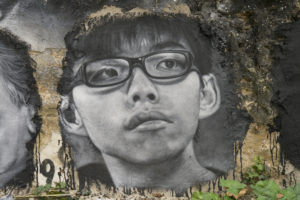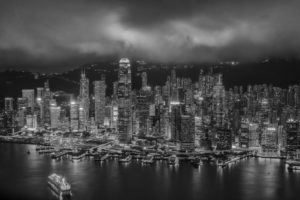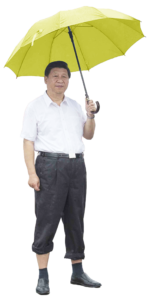In the span of one generation, the people of Hong Kong, formerly under British colonial administration, have seen the joys of democracy juxtaposed with the faceless shadow of communist tyranny. The Chinese Communist Party (CCP) has increasingly interfered in Hong Kong’s political and administrative affairs over the past twenty years. The people live under the watchful, oppressive eye of the CCP as their freedoms of speech, press, assembly, and religion are stripped. In this dark time, the hope for the people of Hong Kong has come in an unusual form. The biggest demonstration of civil disobedience in China since Tiananmen Square in 1989 was spearheaded by high school students no older than nineteen. The recent protests have proven beyond a reasonable doubt what Beijing fears most: there is a credible, organized, peaceful movement with a clear goal: a return to liberty.
This movement can be traced back to the early 1980’s when Great Britain began preparations to return Hong Kong, its last bastion of colonial presence, to the mainland Chinese government by means of the “Sino-British Joint Declaration” in 1997 (20 years ago last July). Under this declaration, Hong Kong was promised a wide variety of freedoms unheard of on the mainland. The region would retain an independent legislature (chosen by universal suffrage) and a judiciary with final adjudication, as well as a continuation of the rights and freedoms of private property and ownership of enterprises. But most importantly before the handoff, the CCP guaranteed the people of Hong Kong the right to elect some of their own officials to the Legislative Council (LegCo). This semi-democratic body of legislators was created before the British transferred power in order to protect some political offices from CCP influence.
All these policies were to remain unchanged for 50 years (until 2047) due to Hong Kong’s legal status as a “Special Administrative Region” (SAR). However, it should come as no surprise that the CCP was quick to obviate the agreement as soon as the territory changed hands. Beijing never intended to allow real democracy.
By abusing a loophole in the Joint Declaration, Beijing’s administrative headquarters in Hong Kong, the Liaison Office, operates outside the legal system that governs the rest of the island. Every local administrative office has a CCP counterpart within the Liaison Office, meaning that each level of government must deal with national intervention and influence at every turn. The Liaison Office’s mere existence diminishes LegCo’s autonomy and authority.
To further undermine the rights of the people of Hong Kong to universal suffrage, a small group of 1,200 pro-CCP elites (consisting of what the United States would denounce as lobbyists and business tycoons with the same set of interests as Beijing) choose the candidates on the ballot for the Chief Executive position in Hong Kong. The final ballot given to Hong Kong voters each election cycle consists of communist loyalists who will inevitably ensure this troublesome region remains under Beijing’s thumb. It was this violation of rights that finally ushered in an age of civil unrest that continues to this day and seems to only worsen as time goes on.

Spearheaded by then-15-year-old Joshua Wong, “Scholarism” was the most vocal group of protesters denouncing this egregious violation of universal suffrage. They initially began as a coalition of high school students formed in 2012 to combat the pro-communist curriculum Beijing illegally imposed on Hong Kong’s schools. Under Wong’s leadership and organizational skills, the group was successful at repealing the CCP’s attempt at sham education reform. The Scholarism protests were triumphant in large part because of the mainland’s softer grip on the former colony. Appeasement seemed like the best approach for former President Hu Jintao and former Executive Leader Leung Chun-ying to deal with the malcontents.
However, in a culture that values stability above all else, the body of Chinese governors interpreted this policy change as a huge blow to its national sovereignty. In the wake of this public embarrassment, the party elected to install a president who was more willing to reinstate national identity into its defiant province. And so, two years later, when the teens shifted their focus from school rights to human rights, the CCP was determined to make an example out of the young dissidents.
During the students’ ensuing protests in 2014, police turned cans of tear gas onto the tens of thousands of peaceful protesters who had overrun the downtown streets of Hong Kong’ Central District for weeks. Hordes of youths shielded their eyes with flimsy gas station umbrellas from the fog of pepper spray as the brunt of President Xi Jinping’s political warfare of intimidation and attrition was waged in full force. The unrelenting new executive leader, Carrie Lam, sent police in tactical gear, throwing flashbang explosives into the crowd to disperse the group. After several months of protest, with numbers waning and local businesses suffering economic repercussions, the people of Hong Kong relented. Protests ceased, and Scholarism was disbanded shortly after.
April 2016 may have marked the end of Scholarism, but the story of the fight for democracy in Hong Kong was far from over. The same members that founded Scholarism regrouped and formed their own political party, named “Demosisto”, to move the fight for fair representation from the streets of Hong Kong to the halls of LegCo.
The members of Demosisto, who were old enough to be eligible for office, ran for Geographical Constituency seats (the only portion of LegCo elected from the general public) on a platform touting a distinct Hong Kong identity and preservation of democratic ideals. They won three seats out of the available thirty-five. But the CCP has a long memory and was far from letting the agitators win another symbolic victory.
The three Demosisto Party members who had been legitimately elected to the Legislative Council—Nathan Law, Lau Siu-Lai, and Eddie Chu—were barred from taking office by Communist Party leaders. They were accused of reciting the oath of office incorrectly, which nullified their eligibility to hold office. Six other pro-independence candidates from a “localist” party called Youngspiration were disqualified from even entering the race on the grounds of their refusal to sign a “confirmation form”, which was essentially a pledge of allegiance to uphold the Party’s authority in Hong Kong.
Joshua Wong and several other fellow Demosisto members were arrested at a protest in June 2017 ahead of President Xi’s arrival in Hong Kong for the 20th anniversary of its reunion with China. After he was convicted of “unlawful assembly”, Joshua’s original sentence (community service) went under review, was revoked, and changed to a much harsher prison sentence. Though he is currently being treated relatively well at the juvenile prison, when he turns 21 come October, he will be transferred to an adult penitentiary where he will be forced to do manual labor for the remainder of his six-month sentence.
What must infuriate the staunchly atheist Chinese regime the most is that Joshua Wong has publicly cited his Christian faith as the reason he continues to uphold the cause for democracy. The face of Demosisto recently said in an interview for The Guardian, “I’m a Christian and my motivation for joining activism is that I think we should be salt and light.” In another Time magazine interview, he summed up the battle with Beijing: “In face of the CCP Goliath, I am optimistic that David can triumph. All we need is time and determination.” Joshua’s parents encouraged his activism because of their own faith and advocacy for the city’s poor and downtrodden.

Young adults in Hong Kong grew up in the wake of an age of personal liberty and thus have only experienced the national government escalating its blatant disregard for basic human rights. In past months, the CCP has been conducting “extralegal cross-border abduction”. Billionaires and political dissidents alike have been snatched from their homes in the dead of night only to reappear in mainland Chinese courts allegedly facing charges for petty crimes that are decades old. An Independent article cited the kidnappings as one of the main reasons Hong Kongers feel that they can no longer trust the legal system in their own SAR out of fear of CCP intervention.
The kidnappings are just some of the most recent examples of how the CCP will not just dissent to the freedoms guaranteed to Hong Kong under the handoff agreement, but will actively seek ways to remind locals that they are only as free as Chairman Xi will allow them to be. One Party spokesman even went so far as to say that the Sino-British Joint Declaration “no longer has any realistic meaning”.
And so, the undaunted youths of Hong Kong continue to fight alone against the monolithic totalitarian regime. Armed solely with a profound mastery of natural rights and a lucid vision for the future, they capitalize on the ever dissolving “two systems” to recruit more members for the cause. Many in the older generation of Hong Kongers fear the futility of protest and buy into the idea that political gains bought at the price of civic and social stability is really no gain at all. But the younger generation sees the future of Hong Kong in just the opposite terms: they view civic peace at the cost of their Joint Declaration-endowed rights to be a state of pseudo-stability thrust upon them by a vicious gerontocracy.
Communist China has obviously committed egregious violations of human rights: from the violent treatment of protestors, to the imprisonment of political dissidents, to the legal manipulation of Hong Kong’s constitution. But, most shockingly of all is the breech of a bilateral, international treaty. The Sino-British Joint Declaration has been desecrated countless times in innumerable capacities.
One has to also wonder: with all the levers of hard, soft, and economic power at its disposal, why the free world’s deafening silence on Hong Kong? And with all its time, money, and energy spent trying to proliferate democracy overseas, where is America’s reply to a once free people calling out for support? The New York Times reported earlier this year that “[t]he State Department stopped issuing periodic assessments of Hong Kong’s political situation in 2007” under then-President Obama. America’s answer, in effect, has been silence. A different Economist article last week said, “The silence of the West, particularly that of Britain, the former colonial power, is depressing.”

Speaking out in support of the people of Hong Kong is not meddling in Chinese internal affairs; it is holding the CCP accountable to abide by an international treaty that they signed. United States foreign policy has shamefully allowed pragmatism and economic expediency to take precedence over human rights. Such an approach will not come without consequence to U.S. leadership throughout the tumultuous region.
In an open letter posted on his official Facebook page, Joshua Wong’s mother, Grace, condemned the corruption within Hong Kong’s government. She said, “Suppression and silencing is not the solution to the cleavages and conflicts in Hong Kong society. A responsible government should face up to the students’ demand for universal suffrage”.
Silence is what Chairman Xi demands, and the United States of America has capitulated.
—
Savannah Husmann is an intern for Providence: A Journal of Christianity and American Foreign Policy. She is currently earning her undergraduate degree in Political Science with an emphasis in French and Economics & Business at Westmont College in Santa Barbara, California.
Feature Photo Credit: Protestor at the 2014 Hong Kong “Umbrella Revolution”. Photo by Studio Incendo, via Flickr.







 Sponsor a student for Christianity & National Security 2024
Sponsor a student for Christianity & National Security 2024